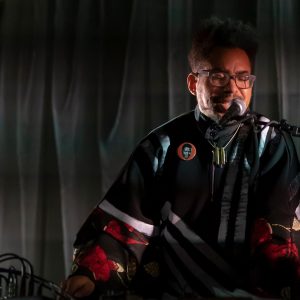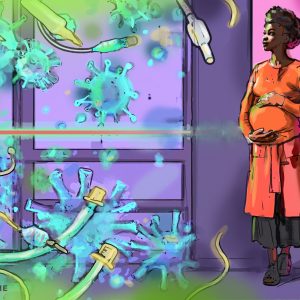HIV and Aids activist Nomandla Yako laid to rest
Described as ‘calm and humble’, Yako was an activist who defied an entire government in a bid to bring affordable care to people living with HIV.
Author:
16 July 2020

The Yako family home was abuzz with excitement following Nomandla Yako’s news that she would be travelling to Brazil. Her sister, Nomvuyiso Yako, laughs as she recalls: “We were just excited. Because our sister was going to go overseas, you know? She was the first family member to, you know, take a flight and go overseas and all those things. So, ja…”
This was, however, no ordinary holiday or work trip. It was 2002 and, frustrated with then president Thabo Mbeki’s Aids denialism and refusal to have antiretrovirals (ARVs) made freely available, Nomandla, an HIV and Aids activist and Treatment Action Campaign (TAC) volunteer, headed to the South American country – along with TAC head Zackie Achmat and Matthew Damane – to procure generic ARVs to bring into South Africa.
“They are doing this to show that if the South African government had the will and took the necessary actions, antiretrovirals could be provided at half the cost currently offered by multinational drug companies in South Africa,” said Doctors Without Borders (MSF) in 2002.
Related article:
“She told us, ‘There is this thing that needs to happen, so I need to go to Brazil with Zackie Achmat.’ Zackie was always visiting the house, so we knew him well. We were not scared for her. No, we just took it as it is. And our parents, kaloko, they were old already, so they couldn’t really say anything. And she brought us all some stuff from Brazil. Like clothes and stuff, you know. We were happy. It was that excitement,” Nomvuyiso adds of her younger sister’s return to the family’s then two-bedroom house in Khayelitsha, Cape Town.
The 42-year-old activist died on 28 June of renal failure as a result of a Covid-19 infection.
Speaking to the Daily Maverick website following news of Nomandla’s death, Achmat said: “The TAC action to import ARVs supported by MSF and Cosatu [the Congress of South African Trade Unions] broke the patent laws, and Nomandla was prepared to go to prison to save lives. At that time we helped save a few thousand lives, today about three million people access ARVs in our country and tens of millions globally because of the actions and sacrifices of people, mainly working-class women such as Nomandla Yako.”

Giving hope
Diagnosed with HIV in 1999, Nomandla was a dedicated HIV and Aids activist and community educator. She also worked at the Red Cross Children’s Hospital as a counsellor.
“As a family, we always gave her support,” says Nomvuyiso. “We were very proud of her. Because she was the first young woman to speak about [HIV and Aids]. Because at that time, there was a stigma around it. Nobody wanted to come out with HIV and stuff, you know. But at the age of 22 – I think she was 22 or 23 – she was speaking out about her status. She had no problem with it. So we also didn’t have a problem with it. We just gave her support.”
Lihle Dlamini met Nomandla in 2004 when they joined Siyayinqoba, an educational HIV and Aids television programme.
“She was this calm young lady, who was so beautiful, man. She was so beautiful and calm and humble. We just clicked. She just clicked with everyone and made everyone comfortable around her,” Dlamini says.
Related article:
Nomandla’s “calm and humble” nature belied a steely determination to push for the rights of those living with HIV. “She played a very, very big role in terms of putting a face to HIV,” says Dlamini. “Especially for young, black women at the time. There were no ARVs in the country at the time. The country only started providing ARVs in 2004. But there she was, living proof that you could live with HIV. Because at the time, many people were dying of Aids-related illnesses.
“So she was one of the people who gave hope to people who didn’t have hope. And she went on to work at the Red Cross Children’s Hospital to give hope to children who were born living with HIV. So she was an influencer and an advocate. Even though she wasn’t loud, she could silently advocate for women’s rights and the rights of people living with HIV. Besides living with HIV and knowing there were no ARVs, she was very hopeful. We need to learn from Nomandla’s struggles – from what she went through – and make sure we take very good care of ourselves. She took care of herself.”
For Nomvuyiso, Nomandla’s death being related to Covid-19 was exponentially more difficult to deal with.
Laying her sister to rest during the nationwide lockdown was, she says, “just so sad, you know. Because you cannot say what you wanted to say, because the time was limited. It was only a one-and-a-half hour service because of the lockdown. So it was very sad.”
Related article:
It was, however, her younger sister’s hospitalisation that Nomvuyiso found the most difficult.
“When she was admitted to hospital … Yoh, from day one, I don’t want to lie to you, it was sad here for us. We were crying, me and my sister. It was so sad. So sad. And you know, the saddest thing is that we cannot go and visit her. That is the worst thing. You cannot go and visit her. You must just communicate with the doctors, because she couldn’t say anything to us. Her phone was off…
“The last time I spoke to her was the Tuesday, the day after she was admitted. I was just checking on her to see how [she is]. And then she said to me, ‘No, there’s nothing better.’ She was still sick. And then she told me the doctors told her she mustn’t speak so much. So I said, ‘No, I was just checking on you. I’ll check on you later on.’ But then when I tried to check on her later on, the phone was off … Until the end. So that was my last conversation with her.”
Had she known that was the last time she would get to speak to her sister, Nomvuyiso says she would simply have told her to “get better”.
“That’s all I would have said: ‘Get better. Just please get better.’ You know?” After a slight pause, she sighs: “But, ja…”



